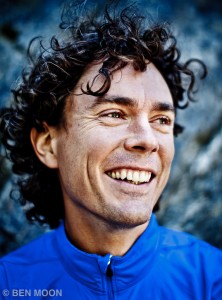 British journalist Natalie Lucas had the opportunity to meet American ultrarunner Scott Jurek. Scott has won some of the toughest ultra races in the world, and attributes a lot of his success down to his vegan diet and his ability to embrace and learn from the pain and discomfort experienced during races that can last more than 24hours. Here’s what he had to say about what inspires him to keep running when things get tough: “Scott Jurek is one of the most dominant ultrarunners in the world. He is a true inspiration and believes anyone can become an ultrarunner! He holds tonnes of victories in ultra-races across the world and has a New York Times bestselling book. So how did he get to achieve so much? Scott grew up in Northern Minnesota and spent most of his childhood in the woods hunting and fishing. “There were no neighbourhood kids around so it was just my sister and brother. We had the simple life,” says Scott. His father was often in between jobs, so life was quite a struggle for the Jurek family. “My mum was a cookery teacher, so I was always either gardening with her, or in the kitchen baking cookies or fresh bread and making preserves. At eight years old Scott’s life turned upside down when his mum got multiple sclerosis. This had a huge impact on his childhood. His mum could no longer look after the house and this became a job for the kids. She unfortunately passed away in 2010 and had to deal with the disease for over 30 years. “I have a body that is capable to run and I feel I have to use that capability. I’m running for those who can.” Scott’s mum had gone to university and his father the military so they impressed on him to work hard at school. It didn’t come easy for Scott, but his strong work ethic got him through. “If I was going to go to college I had to get a scholarship so I had to work very hard. It gave me the motivation to do well.” As well as working hard, Scott was also into Nordic skiing and off-season he was encouraged, by his coach to, either roller blade, cycle or run. Scott didn’t have blades or a bike so running it was. “I started out slowly running one mile then two, eventually achieving eight miles. I certainly didn’t enjoy it at the time. But eventually I learnt to appreciate the satisfaction of finishing each run.” Scott’s friend Dusty dared him to run a marathon together, followed closely by a 50 miler. Scott was just 20 years old and this seemed pretty cool and the perfect challenge, stepping into the unknown. And how could he turn down Dusty? They both finished the local marathon and the following month, were standing in line for the 1994 Minnesota Voyager 50 miler. “I suddenly felt daunted,” remembers Scott, “How on earth was I going to run 50 miles? But I loved the idea of doing something I thought I would never do. Also it was great to be taking on an adventure and getting out of my comfort zone.” Scott was surprised to see all shapes and sizes turn up for the start of the race. He was feeling nervous as he had trained for the marathon, but wondered how you train for a 50 mile race? He certainly hadn’t gone out for a 30 mile or 40 mile training run. He was frightened. “Fear is good for humans, it makes us humble and have respect. It also creates excitement. I was about to embark on 50 miles with just my legs to carry me.” At Scott’s first ultra-race he found himself in the top five and finished in an amazing second place. “After the race, I thought wow, that was the hardest thing I’ve ever done and I will never do it again.” Within days he was changing his mind. Scott had received no success at short distances and was starting to think distance was for him. At this point ultra-running hadn’t exploded worldwide. Scott’s previous hard work at school paid off and he left university with his Masters degree. After caring for his mum he realised he wanted to work within the health care profession and became a physiotherapist. He eventually had his own practice and worked with lots of athletes with sport and chronic injuries. He was based in Seattle, Colorado and worked there for over 15 years. Come 1998 and Scott was looking seriously at the 100 milers on the national scene. He started winning and came out of nowhere. This country boy from Minnesota was suddenly winning big long distance races in the Mid-West of America. He came second in his first 100 mile race and the following year he won the Western States 100 Endurance Race. This became his signature race, as he went on to come first for seven consecutive years from 1999-2005. He was never actually beaten there on, as year eight he decided this race was not for him anymore and he wanted to branch out and try something new. So far all of Scott’s races had been off-road and on the trail. He decided to change pattern and go road-side. Scott came across the historic 153 mile Spartathlon. He went on to win three times. Scott totally appreciated the sport and had a deep respect for it. He was finally recognised and got sponsored and was paid to travel to races. Scott was now dabbling in both off-road and road ultra-races. Scott was still working 40-50 hours a week as a physiotherapist and training like a professional athlete. However, in 2004 his guardian angel was around the corner and Brooks Sports stepped in and saved the day. They became Scott’s sponsor and still are today. This allowed Scott to take ultra-running more seriously. Scott worked closely with the Brooks design team and designed shoes specially for his running needs. “I’ve worked with Brooks over the last nine years and the relationship has been great. They are a serious brand but they are all about the fun in running. They are dedicated to performance but want the runner to enjoy their run. They want to give runners a great experience.” Scott ended up winning nearly all of ultra-running’s elite trail and road events, including the the Hardrock 100, the Badwater 135-mile Ultramarathon and the Miwok 100K. His biggest triumph and his hardest ever race was to be in 2010 at the 24-Hour Run at the World Championships in France. He had to run a one mile loop for 24 hours and the winner was the runner who had run the furthest. “I was struck with the monotony of the course. Nothing else compares in terms of difficulty of a race. It was loop after loop. No mountain terrain to keep my brain alive.” Scott’s mum had recently died and he was running for her and that’s what kept him going. Scott set a new US record in the 24-Hour Run with a total 165.7 miles, equal to running 6.5 marathons in one day. The Washington Times named him one of the top runners of the decade, Runner’s World awarded him a Hero of Running and Ultrarunning Magazine named him Ultra-Runner of the Year three times. Surprisingly all of this was achieved on a plant-based diet, which makes his story all the more interesting. Young hunter Scott had become a vegan. Many of his friends encouraged him to write a recipe book. Scott had always put this off, but finally he gave in. Eat & Run was published to critical success in 2010. And it wasn’t just recipes. Scott opened up about his life and career as an elite athlete. He inspired runners at every level. Scott’s story revealed the power of an iron will and the importance of thinking of food as our fuel. “The inspiration for book was to pass on what I had learned over the years, in terms of running and fuelling my body. Basically, running and eating well was my path to better wellness. My goal was to share that with individuals. By blending two important vehicles I had transformed my life.” Ultra running makes Scott feel like a complete person, it strips him down. “It can be gruelling and at times, I don’t know whether I will make it to the next mountain pass, less alone the finish. However, it makes me mentally stronger, it enables me to be in touch with the natural world, it makes me a better person and because of it, I am able to deal with life. I survive the environment, whatever it throws at me, it’s primal living and I love it.” A huge part of Scott’s inspiration has been his mum. He looked up to her very much and admired the strong lady who became unable to do simple things but still powered on. Her legacy lives on with his achievements.
British journalist Natalie Lucas had the opportunity to meet American ultrarunner Scott Jurek. Scott has won some of the toughest ultra races in the world, and attributes a lot of his success down to his vegan diet and his ability to embrace and learn from the pain and discomfort experienced during races that can last more than 24hours. Here’s what he had to say about what inspires him to keep running when things get tough: “Scott Jurek is one of the most dominant ultrarunners in the world. He is a true inspiration and believes anyone can become an ultrarunner! He holds tonnes of victories in ultra-races across the world and has a New York Times bestselling book. So how did he get to achieve so much? Scott grew up in Northern Minnesota and spent most of his childhood in the woods hunting and fishing. “There were no neighbourhood kids around so it was just my sister and brother. We had the simple life,” says Scott. His father was often in between jobs, so life was quite a struggle for the Jurek family. “My mum was a cookery teacher, so I was always either gardening with her, or in the kitchen baking cookies or fresh bread and making preserves. At eight years old Scott’s life turned upside down when his mum got multiple sclerosis. This had a huge impact on his childhood. His mum could no longer look after the house and this became a job for the kids. She unfortunately passed away in 2010 and had to deal with the disease for over 30 years. “I have a body that is capable to run and I feel I have to use that capability. I’m running for those who can.” Scott’s mum had gone to university and his father the military so they impressed on him to work hard at school. It didn’t come easy for Scott, but his strong work ethic got him through. “If I was going to go to college I had to get a scholarship so I had to work very hard. It gave me the motivation to do well.” As well as working hard, Scott was also into Nordic skiing and off-season he was encouraged, by his coach to, either roller blade, cycle or run. Scott didn’t have blades or a bike so running it was. “I started out slowly running one mile then two, eventually achieving eight miles. I certainly didn’t enjoy it at the time. But eventually I learnt to appreciate the satisfaction of finishing each run.” Scott’s friend Dusty dared him to run a marathon together, followed closely by a 50 miler. Scott was just 20 years old and this seemed pretty cool and the perfect challenge, stepping into the unknown. And how could he turn down Dusty? They both finished the local marathon and the following month, were standing in line for the 1994 Minnesota Voyager 50 miler. “I suddenly felt daunted,” remembers Scott, “How on earth was I going to run 50 miles? But I loved the idea of doing something I thought I would never do. Also it was great to be taking on an adventure and getting out of my comfort zone.” Scott was surprised to see all shapes and sizes turn up for the start of the race. He was feeling nervous as he had trained for the marathon, but wondered how you train for a 50 mile race? He certainly hadn’t gone out for a 30 mile or 40 mile training run. He was frightened. “Fear is good for humans, it makes us humble and have respect. It also creates excitement. I was about to embark on 50 miles with just my legs to carry me.” At Scott’s first ultra-race he found himself in the top five and finished in an amazing second place. “After the race, I thought wow, that was the hardest thing I’ve ever done and I will never do it again.” Within days he was changing his mind. Scott had received no success at short distances and was starting to think distance was for him. At this point ultra-running hadn’t exploded worldwide. Scott’s previous hard work at school paid off and he left university with his Masters degree. After caring for his mum he realised he wanted to work within the health care profession and became a physiotherapist. He eventually had his own practice and worked with lots of athletes with sport and chronic injuries. He was based in Seattle, Colorado and worked there for over 15 years. Come 1998 and Scott was looking seriously at the 100 milers on the national scene. He started winning and came out of nowhere. This country boy from Minnesota was suddenly winning big long distance races in the Mid-West of America. He came second in his first 100 mile race and the following year he won the Western States 100 Endurance Race. This became his signature race, as he went on to come first for seven consecutive years from 1999-2005. He was never actually beaten there on, as year eight he decided this race was not for him anymore and he wanted to branch out and try something new. So far all of Scott’s races had been off-road and on the trail. He decided to change pattern and go road-side. Scott came across the historic 153 mile Spartathlon. He went on to win three times. Scott totally appreciated the sport and had a deep respect for it. He was finally recognised and got sponsored and was paid to travel to races. Scott was now dabbling in both off-road and road ultra-races. Scott was still working 40-50 hours a week as a physiotherapist and training like a professional athlete. However, in 2004 his guardian angel was around the corner and Brooks Sports stepped in and saved the day. They became Scott’s sponsor and still are today. This allowed Scott to take ultra-running more seriously. Scott worked closely with the Brooks design team and designed shoes specially for his running needs. “I’ve worked with Brooks over the last nine years and the relationship has been great. They are a serious brand but they are all about the fun in running. They are dedicated to performance but want the runner to enjoy their run. They want to give runners a great experience.” Scott ended up winning nearly all of ultra-running’s elite trail and road events, including the the Hardrock 100, the Badwater 135-mile Ultramarathon and the Miwok 100K. His biggest triumph and his hardest ever race was to be in 2010 at the 24-Hour Run at the World Championships in France. He had to run a one mile loop for 24 hours and the winner was the runner who had run the furthest. “I was struck with the monotony of the course. Nothing else compares in terms of difficulty of a race. It was loop after loop. No mountain terrain to keep my brain alive.” Scott’s mum had recently died and he was running for her and that’s what kept him going. Scott set a new US record in the 24-Hour Run with a total 165.7 miles, equal to running 6.5 marathons in one day. The Washington Times named him one of the top runners of the decade, Runner’s World awarded him a Hero of Running and Ultrarunning Magazine named him Ultra-Runner of the Year three times. Surprisingly all of this was achieved on a plant-based diet, which makes his story all the more interesting. Young hunter Scott had become a vegan. Many of his friends encouraged him to write a recipe book. Scott had always put this off, but finally he gave in. Eat & Run was published to critical success in 2010. And it wasn’t just recipes. Scott opened up about his life and career as an elite athlete. He inspired runners at every level. Scott’s story revealed the power of an iron will and the importance of thinking of food as our fuel. “The inspiration for book was to pass on what I had learned over the years, in terms of running and fuelling my body. Basically, running and eating well was my path to better wellness. My goal was to share that with individuals. By blending two important vehicles I had transformed my life.” Ultra running makes Scott feel like a complete person, it strips him down. “It can be gruelling and at times, I don’t know whether I will make it to the next mountain pass, less alone the finish. However, it makes me mentally stronger, it enables me to be in touch with the natural world, it makes me a better person and because of it, I am able to deal with life. I survive the environment, whatever it throws at me, it’s primal living and I love it.” A huge part of Scott’s inspiration has been his mum. He looked up to her very much and admired the strong lady who became unable to do simple things but still powered on. Her legacy lives on with his achievements.



 Subscribe to our newsletter to have the latest updates delivered straight to your inbox.
Subscribe to our newsletter to have the latest updates delivered straight to your inbox. TRI60 DISTANCE TRAINING
TRI60 DISTANCE TRAINING 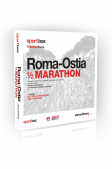 Sportbox Training Focus Roma-Ostia Half Marathon 2019
Sportbox Training Focus Roma-Ostia Half Marathon 2019 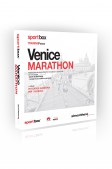 Sportbox Training Focus Venice Marathon 2019
Sportbox Training Focus Venice Marathon 2019 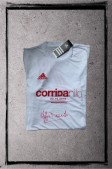 t-shirt limited edition autographed by Danilo Goffi
t-shirt limited edition autographed by Danilo Goffi 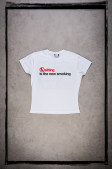 Women's Sitting technical t-shirt
Women's Sitting technical t-shirt 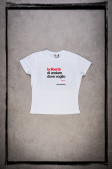 Women's dove voglio technical t-shirt
Women's dove voglio technical t-shirt 